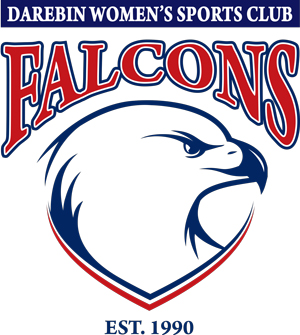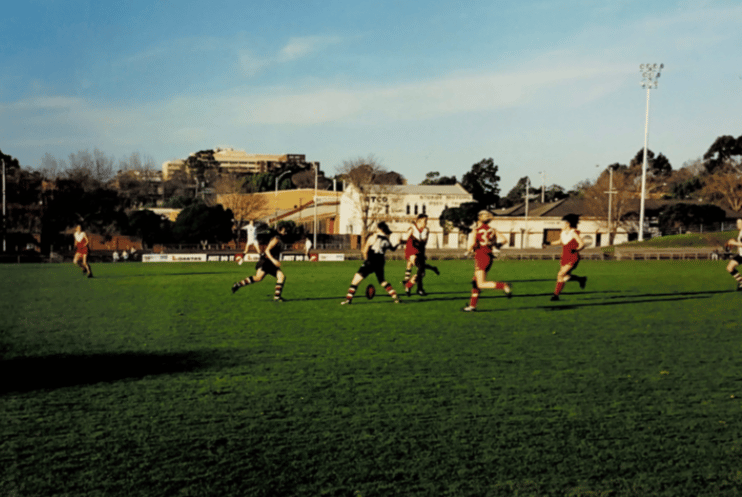At the end of the 1989 Victorian Women’s Football League (VWFL) season, the Fairfield Falcons had lost all but one player. It looked likely to be a disappointing end to the club’s involvement with the only women’s football league in the state after first forming in 1987. But fate would intervene.
A group of local women—among them Sal Rees who would go on to be president of the Falcons—discovered that there was a women’s Aussie rules football league and decided that they wanted to play. This would be the salvation of the Fairfield Falcons and the beginning of the story of the Darebin Women’s Sport Club.
Alongside Sal Rees were women like Lori Roache, Brenda Carmine, Colleen Vale, Fran Ryan, Kelly McDonald, Bev Higgins, Jodie Brown and Marg Ditton. Many of the founding members and players worked in the community sector. Unsurprisingly, their values—fairness, equality, inclusivity—were embedded in the very fabric of the club from its inception. Those values are something founding member Colleen Vale recalled being drawn to.
“The community that was developed in the club… back then about supporting each other irrespective of where we came from, and what our background was, and what our sexuality was, and all those kinds of things… that was something that was really strong right from the very beginning, and has continued through the history… that it’s a women’s club and it’s for women, run by women, and about women to support women. All of those things were very, very strong right from the beginning,” Colleen said.
In that first year, the team played at an oval in Fairfield that was right next to the Fairlea Women’s Prison. “So you can imagine the names that the other clubs gave us,” Sal said. “The Fairlea Falcons, they called us. Which we found quite amusing.”
Sal recalls that in the early 90s, the team did some footy clinics in the prison. It’s something she believes demonstrates that community and social focus that existed within the club. “That’s pretty much how the club set ourselves up right from the start,” she said.
“We didn’t have a ‘No, you can’t kick very well, go away piss off’, you know, kind of approach,” Colleen said. “We did want people [to] learn and teach each other and support each other.”
In 1990, founding member Lori Roache coached the team. One of the Falcons star players that year was 19-year-old Fiona McCaulay who shared the Falcons inaugural best and fairest in 1990 with Lisa O’Toole. Throughout that season, the team continued the alignment with the Fairfield Falcons Football Club but the relationship soon soured.
“It only took us one season and we said ‘nup, we’re out of here’,” Sal said. She recalls having to wear the men’s jumpers on the Sunday after they had played in them on the Saturday: “[it] was pretty gross… they were predominantly white and they had a red stripe so you can imagine a muddy Saturday, and we get these revolting jumpers on the Sunday.”
It wasn’t the only point of contention. Fiona recalls coming into the club rooms on a Sunday morning and finding comments and drawings scrawled on the blackboard. “They were obviously pretty discriminatory against us [and] I remember a group of the older women saying ‘we’ve got to find our own club’.”
That 1991 season would be the first that the team played under their own banner—a club run by, and for, women. At the time, the Falcons were the only standalone club in the VWFL. But with the decision to go it alone, came a particularly pressing requirement: the Falcons needed a new home. With the help of the local council, they moved to McDonell Park in Northcote. It would be the club’s home until their move to AH Capp Reserve in 2005.
“I remember just meeting in someone’s lounge room and we drew up a constitution of what we wanted out of the club,” Fiona said. “Once we moved [to McDonell Park], it was just a whole different story to that first year at Fairfield.”
Those early years while the club was finding its feet were tough.
“[It] was great, because it was just women,” Fiona said. “But it was also a lot more work. Because we had to mark the grounds and tidy up the club rooms and all that kind of thing. We had to run it basically ourselves, get a canteen up and running.”
In 1991, Colleen Vale took over as coach, a role she’d hold for three seasons, until Deb ‘Henry’ Lawson took over in 1994. Colleen would also take on the role of President of the VWFL. In her tenure, the league would expand from 4 teams to 7; the best and fairest medal would be named for the leagues’ first President: Helen Lambert; and the first of the state games would be played, the beginning of the national championships which were the precursor to the AFLW.
In 1992, Kris Gardiner joined the Falcons. A talented footballer, Kris won the VWFL best and fairest in her debut year with the club—the first Falcon to win the award but certainly not the last.
It was a chance meeting at a local women’s cricket match that introduced Kris to the VWFL and the Falcons. She recalls heading down to a training session at McDonell Park and seeing “a bunch of women running around”, something “you didn’t sort of hear of… in those days.”
Winning the league best and fairest in her debut year—alongside the club award—is something Kris said she didn’t think much about at the time. “I didn’t realise what a big deal it was at that time. I think I was just young, but looking back, obviously, I’m quite proud about that achievement.”
Not unlike other women’s teams of the period, in those early years the Falcons often struggled to get enough players to field a team. “We had so few people at one stage that there were like a couple of old ladies walking their dog around the oval and we’re like, ‘Hey, do you want to play footy?’ Like we need someone for this Sunday because you needed to field 22 players and it was hard to get that sort of interest,” Fiona said.
“The thing was that back in the early years… the publicity that we got back then was fairly negative,” Sal said. “And it was really frowned upon—women playing Australian rules football shouldn’t be happening.”
“We did cop a lot of crap,” Kris Gardiner recalled. “Even spectators sometimes, that would come down and they’d stop because they’d never seen women [playing]… don’t get me wrong, there [were] some amazing supporters out there that would come every week … but yeah, at times they were people that were really quite rude and sexist and yelling out really terrible things.”
Despite the lack of on-field success—”We were terrible” Fiona recalled— the Falcons were building something that would sustain the club more than any win or premiership ever would. They were building a culture that prioritised fairness and fun, that was inclusive and welcoming and that wanted to contribute positively to the local community—providing a safe and encouraging environment for women and later girls—to play sport. Those values were cemented in the hard slog of establishing a club and in the years that followed.
“It was incredible. Like, it was the most fun that I’ve ever had. And those five years… they were the toughest, but they were also the most fun,” Fiona said.
Many of the founding members, including Fran Ryan and Brenda Carmine were involved in the early administration of the club but in 1994, Sal Rees took over as club president—a role that she would hold for a decade. It was a period of time where the Falcons established themselves as a women’s sports club.

